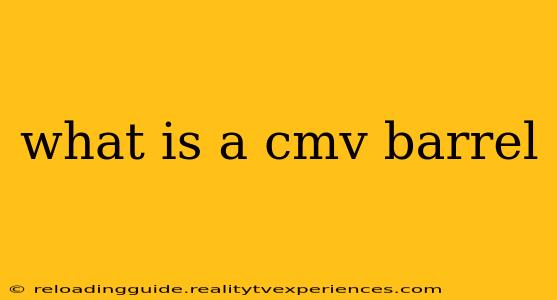For firearm enthusiasts, the term "CMV barrel" might sound like jargon, but understanding its significance is crucial for choosing high-quality firearms. This comprehensive guide will delve into what a CMV barrel is, its advantages and disadvantages, and why it's a popular choice among shooters.
Decoding CMV: Chrome Moly Vanadium Steel
CMV stands for Chrome Moly Vanadium, a type of steel alloy frequently used in the manufacturing of gun barrels. The "Chrome" refers to chromium, "Moly" to molybdenum, and "Vanadium" to vanadium—all crucial alloying elements that significantly enhance the steel's properties. These elements are added to standard carbon steel to improve its strength, durability, and resistance to wear and tear.
The Benefits of CMV Steel Barrels
CMV barrels offer a compelling combination of features that make them attractive to both casual and serious shooters:
-
Enhanced Strength and Durability: The addition of chromium, molybdenum, and vanadium increases the steel's tensile strength, making it less prone to deformation or damage under high pressure. This is especially important in firearms, where barrels withstand immense forces during firing.
-
Improved Wear Resistance: CMV steel exhibits superior resistance to erosion and wear compared to standard steel barrels. This translates to a longer barrel lifespan and improved accuracy over time, as the barrel's rifling remains intact for longer.
-
Better Heat Resistance: The alloying elements contribute to improved heat resistance, reducing the likelihood of barrel overheating during rapid firing. This is particularly beneficial for users who frequently engage in target practice or competitive shooting.
-
Cost-Effective Solution: While CMV barrels are not the cheapest option on the market, they offer a balance between performance and price. They represent a significant step up from standard carbon steel barrels without the hefty price tag of more exotic materials like stainless steel or titanium.
Are There Any Downsides to CMV Barrels?
While CMV barrels offer numerous advantages, it's important to acknowledge potential drawbacks:
-
Potential for Rust: Although more resistant than standard steel, CMV barrels are still susceptible to rust if not properly maintained and cleaned after use. Regular cleaning and lubrication are crucial for preserving the barrel's longevity.
-
Not as Corrosion Resistant as Stainless Steel: Compared to stainless steel barrels, CMV barrels offer less inherent resistance to corrosion. While proper care mitigates this, stainless steel remains the superior choice in consistently humid or harsh environments.
CMV Barrels vs. Other Barrel Materials
Choosing the right barrel material depends on individual needs and priorities. CMV represents a solid middle ground, providing excellent performance without the premium cost of other options. Here's a brief comparison:
-
CMV vs. Carbon Steel: CMV significantly surpasses standard carbon steel in terms of strength, durability, and wear resistance.
-
CMV vs. Stainless Steel: Stainless steel generally exhibits better corrosion resistance, while CMV often offers slightly superior strength and potentially better accuracy (depending on manufacturing and other factors).
-
CMV vs. Chrome-lined Barrels: Chrome-lined barrels provide exceptional corrosion resistance but may have slightly reduced accuracy compared to CMV barrels.
Conclusion: A Practical Choice for Many Shooters
CMV barrels provide a strong and reliable option for firearms enthusiasts seeking a balance between performance and cost. Their enhanced strength, durability, and wear resistance make them suitable for a wide range of shooting applications. However, remember that proper cleaning and maintenance are crucial for maximizing their lifespan and preventing rust. Understanding the properties of CMV steel allows for informed decision-making when choosing a firearm or upgrading components.

